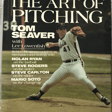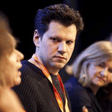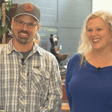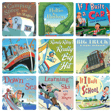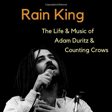Become a Creator today!Start creating today - Share your story with the world!
Start for free
00:00:00
00:00:01

The Counting Crows Origin Story with Graeme Brown and Chris Getto
Fastest Fox Alive lead singer, Chris Getto, helps Graeme breakdown the Counting Crows origin story, how close The Luke and Chris Band was to making it big, and why it is important to do what you love.
"Hey Mom, look at me! I'm a rock and roll star!"--A.D.
Transcript
Introduction and Listener Appreciation
00:00:00
Speaker
Hey everybody, and welcome back to the Walk Out on a Wire once again podcast. I am your host, Graham Brown. And first things first, I really wanted to just thank everybody for listening to our first podcast, which was the June 5th 23 Review of the Counting Crows show at the Troubadour Theatre. I really
00:00:23
Speaker
did not imagine that the podcast would reach as many people as it did. And I want to thank you all for listening and also specifically to those folks who took the time to make comments. I really appreciate that. It means a lot to know that people are out there listening and are interested in what we're talking about. So thank you very much.
Episode Preview and Special Guest
00:00:41
Speaker
I would also say that we've got a great show for you today. We're going to have my good friend Christopher Ghetto on the phone. We're going to do a little bit of Counting Crow's origin story, as well as just dive into what Chris has been working on. He's the lead singer in a new band. They have an album coming out, so definitely want to pick his brain about that.
00:01:02
Speaker
I would also be remiss if I didn't give a shout out to the Sullivan Street podcast. Definitely pioneers in that space and some folks that really inspired me and some of my good friends to talk a little bit more about the band that we love. So big shout out to Sullivan Street podcast. Definitely check that out. I'll be listening. I'm already a big fan. So I wanted to make sure to recognize those guys as they definitely, again, were an inspiration
00:01:32
Speaker
for me here.
Meet Christopher Ghetto
00:01:34
Speaker
Alright, with that, let's get into it for a second episode coming up with Mr. Christopher Jettow.
00:02:07
Speaker
pumped up after that one of my all-time favorite Adam Duritz uh many speeches if you will about becoming a rock and roll star realizing he's a rock and roll star but we're here today to talk about how he got there and as I mentioned we have my good friend Mr. Christopher Ghetto with us Chris welcome
00:02:32
Speaker
Oh, Graham, thank you for having me, man. I must have missed the invitation to the first podcast, but I will take seconds. I'm just happy to be here. Thank you, man, for having me. Please, by the end of this podcast run, you'll be begging me. You'll actually have changed your numbers so that I can't track you down. But as I mentioned, we're pretty fired up after that intro from DeRitz.
00:02:54
Speaker
And we're actually going to talk about how he got there, how he became a rock star. This is the origin story podcast. So, uh, we're going to do a deep dive into what turned Adam Druitts and the band into rock and roll stars. But before we do that, a quick background about Chris and Chris, feel free to keep me on the steer at
Chris's Musical Journey and Current Projects
00:03:13
Speaker
the end. But, uh, as I said, good friend born and raised in Los Angeles, uh, was the lead singer of a band, the Luke and Chris band, which is how we met actually. Um, and we'll get into that a little bit.
00:03:25
Speaker
is now the lead singer of a band in Boise, Idaho called Fastest Fox Alive. So we're going to ask some questions about that. Also holds a master's in family therapy, which based on the way this podcast is going, we're going to need some help with. And actually also, we've talked about doing a little something along the lines of music and, you know, and therapy on music relates to people. So we will not necessarily roll that out right now, but something we can look forward to.
00:03:55
Speaker
Chris, again, welcome to the podcast. Anything that I messed up in your bio.
00:04:00
Speaker
No, that was beautiful. Thank you, man. Yes, you know, got to push the fastest Fox alive, rolling some songs out on 630. Got that little three-song EP. So, you know, as you can tell, I haven't let that dream go. I'm still going for it. I love it. I love it. Now, just out of curiosity, before we get into the origin story, like Butter Miracle, will you be forced to play that EP from start to finish in the middle of a longer conference?
00:04:25
Speaker
You mean, will I force my 10 fans to listen to it? You mean? Absolutely. I absolutely will. Yeah, which is very hypocritical. Yes. I'm sure you will. I'm sure you will have many more than 10 fans. I've heard so many early song. They sound great, but you know, I would be remiss if I didn't ask you, I know we had talked. This is not the troubadour show. You heard my full on meltdown in the first episode about that concert. However, I had reached out to you.
00:04:51
Speaker
about that and told you at the concert at the time you were very uh displeased is the word i would use about the fact that you uh were not able to make the show so i want to just
00:05:01
Speaker
Kick it to
Concert Disappointments and Memorable Moments
00:05:02
Speaker
you first. Take me through the emotions about the Troubadour show from start to finish. I'll just turn the mic over to you here. Yeah, I, you know, of course, got the link you sent me to the first podcast and I saw the title of it, Troubadour Travesty. And I knew, of course, knew immediately why it was a travesty and thought, you know, it could have aptly have been named the Troubadour told yourself, you know, because sort of knew that was going to happen. But
00:05:29
Speaker
Oh man, Troubadour grew up in LA and have always known the Troubadour as this iconic, live, intimate venue full of rock history moments, US LA debuts, live of the Troubadour recordings, post-arena, impromptu shows, secret shows, record release shows. I mean, this place is just full of rock history. And so I was, you know, never had been there, right? So now my favorite band of all time.
00:05:59
Speaker
is gonna play there. I've moved out of LA, of course, at this point, so now I'm in Boise, and hearing about this concert that's happening, so I can't believe this is going on. Then I find out, well, I can't believe it's going on, and I'm not gonna be there, right? Then I find out, I can't believe this is going on, I'm not gonna be there, but Graham got tickets to this thing, right? Even worse. Yeah, just when it couldn't get any worse, right? But Graham's not going, I can't believe this is happening, I'm not going, Graham is going,
00:06:28
Speaker
And oh man, how disappointed he is going to be when he realizes that they're going to roll out with, you know, when seven out of the 15 songs or whatever are going to be songs he does not like. Yeah, it's incredible. So I'm sure you felt a little bit better about not having to spring for a last minute ticket to Los Angeles to see them play Butterfly in Reverse.
00:06:52
Speaker
Yeah. And then the, you know, the cool 750 that those, you know, secondhand tickets were going for too, right? That would have been a little much. Yeah. It's true. Yeah. As Fowler mentioned, you know, in the podcast, there was just zero chance that they were going to live up to your expectations or, you know, probably the majority of people in that crowd.
00:07:13
Speaker
You know, yeah, I think, I think that's probably correct, but I, you know, and this is something that I know you have some experience with, um, just in terms of, so I feel like, you know, Ryan Fowler in the first episode brought up the fact that I'd be perpetually disappointed. And that's just kind of my relationship with the County Crows. You, I think share some of my frustration. That might be more of our bond, but maybe can you tell, can you give us a little of your like backstory? What's your, not maybe your County Crows experience, but
00:07:42
Speaker
you know, why you liked them, how you got into them and what your experience has been as a fan before we get into the history.
00:07:47
Speaker
Yeah, the history. Do you want to hear about my origin story with Kenny Groves? Yeah, I want to hear about your origin story. We tricked the crowd into thinking we were talking about the Kenny Groves origin story, but I want to hear about your origin story. Just kidding. No, but before we dive into that, I do think it's worth mentioning that just when you probably thought it couldn't get any worse, right? They just, we just played a show in Omaha. And the set list, I'm sure you've seen it already, the set list, but
00:08:17
Speaker
no butter miracle and probably would have been the greatest show you'd ever seen if they had done that set list at the Troubadour. Yes, so to bring everyone up to speed and what Chris is talking about is that the County Crows just opened their tour, which was the Troubadour show was the kickoff to, and they played their first show in Omaha, Nebraska. Now, you know, when you're thinking as a band, where do you really want to bring
00:08:41
Speaker
Do you want to bring it at the Troubadour in front of celebs like myself and Cindy Crawford? Or do you want to save that and just hammer it in Omaha, Nebraska? The answer is obviously always Omaha, Nebraska, where they played 18 songs, not one song from the Butter Miracle Suite EP, which as to recap, they played the entire thing, and also played like
00:09:07
Speaker
Anna begins, Washington Square, Sullivan Street. Time and time again, that's, yeah. Time and time again, Richard Manuel. I mean, yeah, so yes, I am extremely, thank you. That's just literally salt in the open wound that's still healing. Exactly right, exactly. They still did give a beer run, you know, which is normally around songs nine and 10. They threw in blues run the game in front of the devil, which, you know,
00:09:33
Speaker
I liked it the first 10 times I heard it. But I'm done with it now. Thank you. So I was let down, but have you been let down in the past with the Cannon Crows? Have you been let down in the past with the Cannon Crows?
00:09:51
Speaker
Yes, of course. I mean, we've shared those moments at concerts. But some of that I do realize is just that, and this is part of that tortured relationship, is it comes from a place of loving them so much and having this feeling like there's just so much potential there.
00:10:09
Speaker
And then feeling like, you know, maybe selfishly, you're not playing the songs that I really want to hear or that or that at least I feel like most of the fans do, most of the fans want to hear. And I don't know how to how to, you know, that process could be democratized. I don't really, you know.
00:10:25
Speaker
probably never. Although I, you know, in sort of doing a little bit of reading and thinking like, maybe I should have some things to talk about in this podcast. I read somewhere that that Adam doesn't make the set list or has hasn't come on that that and that Dave is the one that makes the say that this is, um, sorry, I didn't read it. I actually heard Adam say it in an interview.
00:10:47
Speaker
that Dave has always made the set list because Adam's like, I'm just too neurotic. Like I, I would just keep changing it. I could never finish one. Wow. Yeah, that's incredible. That's, that's interesting because Dave looks forlorn on the side of the stage, which he's a key part of the origin stories. We're going to get into here in a second. That's interesting to know that he's the one, be sure that Adam does not like a buzzer with like an electrical like thing. And I mean, he's like, I want to play.
00:11:14
Speaker
Murder of One, he's like, wrong answer. And he's like, okay, elevator boots. While you and I did have some experiences with the show, we'll probably do a three way pod, seeing them at the Wiltern, actually with Ryan Fowler in, and a couple other friends actually in Los Angeles, which was a great show. But the funny part about that story that we can tease now is that it was an amazing show, right? I would say that was probably one of the best shows ever, I've ever seen when the cat grows.
00:11:44
Speaker
But even better than that was at the end of the show, we all decided to go out in Hollywood and you were like, I'm going home. And we just happened to run into Daritz at the standard hotel on Sunset where he said, oh, I remember you guys were in the front singing and we talked to him for a while. And where would that rank amongst your disappointments over the county?
00:12:07
Speaker
That's top five for sure. That's top five. How about missing the meet and greet at the Greek theater? Where would you put that one? I mean, I have I've been I've done one of the meet and greets, you know, so but but so that's fine. That's fine. How many times does there it's really want to see me and he never wants to see us again. I'll say that right now.
00:12:29
Speaker
Yeah. The concert where I wore a dreadlocks wig and got a little bit of negative attention from him, that wasn't exactly how I planned that to go. Maybe that was too much. I realized that a little too late. When Charlie, I think we were at the Greek
00:12:48
Speaker
And when I say we, that's you and me at the Greek. And we got around to the side of the stage up front. Charlie's playing the accordion. I turn to take a picture for you to get me like right up at stage. Charlie's right above me. He steps on my head.
00:13:05
Speaker
Yes. And the crowd's like, yeah, stepping on my head. And unfortunately, you know, I don't want to blame you totally for that. But I do have to throw you under the bus. You missed the shot. Didn't get it. That rings up there in the top five regrets. So that's a look, my tortured relationship with them is a little bit about these moments where as a fan,
00:13:28
Speaker
You know, I love their music so much. I've seen them, you know, so many times. And now I want more out of experiences. Right. Now I'm like, I want to get a stick or, you know, those other types of moments. All things of them. But yes, you're underselling that moment. And I think this is important before we get into the meat of this pod here. But that particular show, it was the Toe the Wet Sprocket, Counting Crow show. And prior to that, I believe,
00:13:56
Speaker
Toad the Wisconsinette closed with Walk on the Ocean, and Glenn Phillips, the lead singer of Toad, you know, does this pause before he begins, and you started off singing like, we spotted! And the crowd laughed. He turned to you. I mean, that's how much of a part of the show you were at that point. So that later, when you got Charlie's foot on your head,
00:14:19
Speaker
And I wouldn't blame me, I would blame Stone Brewing because I'd had a few IPAs at that point. And I didn't get the photo. We were basically part of the show. And I think the other part about this is that for anyone who's been to a concert with you or me, you are either really happy that you've got people that are pumped up to sing the songs or really unhappy that you might hear our version of the songs and not the kind of gross versions. Yeah, I would say that's 5% happy till 95% unhappy.
00:14:50
Speaker
Ah, I totally agree. Apologies to all those fans. Okay, so hey, let's dive in here. And, you know, I just want to walk people through quickly the background
Origins of Counting Crows and Adam Duritz's Story
00:15:03
Speaker
story. I think most people listening to this podcast are probably not casual fans, so they may know this. And there's probably gaps in my research here. But I just, it was interesting for me, and I'm interested in your thoughts. It's interesting for me to kind of dive into some of this stuff, because some of these things I remember looking up back in the day,
00:15:19
Speaker
And learning as I became a fan, it was part of what made me a fan. It was, you know, early internet days, finding these blogs or these interviews with Adam Duritz or the band members or, you know, early YouTube days and finding documentaries. And to be honest, for about 25 years, I stopped because I kind of felt like, yeah, I've got it. Like I understand the story, but there were a lot of holes in my own knowledge and some interesting stuff that I wanted to get into. So.
00:15:44
Speaker
before I break down the timeline, is that, was that a similar experience for you or how did you find the process is just like doing a half day of research on this topic? Yeah, no, similarly realized, you know, I knew a little bit about Duritz and kind of his journey, but absolutely did not know anything really about the other players. And I, which is, you know, uh,
00:16:08
Speaker
doesn't reveal me to be the greatest fan maybe of all time, because one of the things I think makes the County Crows so good is how amazing each of them are as individual musicians, right? And it's not like these guys just came together, started County Crows, each of them has like a music past and each in their own right are just insane musicians. So learning about that was fun.
00:16:33
Speaker
I agree, that's a great place to kick it off. So the basic backstory here, and Chris, you can fill in some gaps for me, but essentially if we're going to start a categories history lesson, we have to start it in Berkeley, where Adam Duritz is at college. He begins essentially writing his first song using a piano that was across the hallway from him in his dorm room. He writes his first song for his younger sister at the time.
00:17:02
Speaker
And he said that really, that was a huge moment for him. The name of that song is Good Morning, Little Sister. He then goes on to play music in a couple of Bay Area bands. Sorted Humor is one of those bands where he meets a gentleman by the name of Marty Jones. Or maybe he's already met him, but they play together. Then they play in a band called the Himalayans.
00:17:25
Speaker
which also has Marty Jones, and through that relationship, he meets Dave Bryson, who's a producer in the Bay Area. And he did, Bryson did some producing, right, for the Himalayan? Yes, I believe he was a producer. And then, yeah, I think he wound up becoming the original founding member with Duritz for County Crows. Essentially after that, Duritz takes a little hiatus, goes to Europe, comes back,
00:17:55
Speaker
And I'm kind of breezing through these, but we're going to revisit them. And then we have the early Counting Crows and we get the band lineup. So, I mean, that's, there's a lot in each of those chapters, but I guess out of that, where do you want to start? Like, what's the most interesting piece of that? Because I don't know if we need to do a deep dive in each of them, but like, what stood out to you when you were reading through that kind of history?
00:18:24
Speaker
I've only now come to a place where I can start talking to myself as really like a songwriter, right? Well, I feel confident enough to say that now that I've written a fair amount of songs. And I loved hearing him talk about those early days where he was getting an English degree at Berkeley.
00:18:49
Speaker
was realizing that he was good at writing, but didn't love writing some of the papers, and found himself becoming pretty addicted to meddling around the piano, and then wrote that song. And the minute he wrote that song, it was sort of like it clicked. I was able to find some chords that sounded pretty good, and then wrote some stuff out, had some melody. And then once he had a song, it was sort of like this shift to, this is who I am.
00:19:17
Speaker
now. And he talked a little bit about that where it was like, you know, a lot of my friends, what I loved hearing him say is, I knew in that moment that I was a songwriter.
00:19:28
Speaker
This is what I wanted to do. Now he's like, I fell way behind later when all my friends went out and got jobs and stuff like that and went on to these careers. And I was struggling to figure out how I'm going to turn this into making a living. But for me, it just gives me chills to hear him say, in that moment, I knew who I was. I knew that I was a songwriter. And this is what I was going to do no matter what.
00:19:50
Speaker
No matter what. And you know, I think that is one of the reasons that this music connects with me so much is because I think in a way I live vicariously through him because I was never able to make that shift and say, I'm going to do music no matter what.
00:20:05
Speaker
There was, I wanted to write and I did some music, but I, you know, it's like I knew I didn't have that full confidence that that's part of who I was. It was just sort of like, well, I'm going to get, I'm going to try it. I'm going to give it a shot. You know, and it wasn't that the way he describes it. It was like, this is what I'm going to do. And this is who I am. A hundred percent. So yeah, I think that's a great call out.
00:20:27
Speaker
I thought the same thing, right? That's what's incredible to me about this is that he's, he, yes, he had told a story in one of these podcasts about how he had kissed a girl behind a school one time after he sang him, or he didn't kiss a girl, but like girls were interested in him after he sang behind a school. And so he kind of thought that was cool. And a lot of his like pods are about how he's doing it for girls, which I think when you're young, that's kind of what you're doing for friends and for girls. But yeah, I thought that was great. He writes that song takes about five hours. I think he said something like that. And then he realizes like, I'm a songwriter. Like this is what I'm going to do.
00:20:56
Speaker
And then he does it. And I think that's very inspiring, as you mentioned. I think it's super cool, but it did make me, you know, think about you. And there's a couple other pieces here, but I actually thought it was fascinating that he did say, you know, I was ahead of all my friends because I knew what I wanted to do. And then when you're in college and you're getting out of college, everyone's trying to figure out like, what are we going to do, right?
00:21:25
Speaker
a banking route, some people do whatever. And you feel like, you know, you're trying to find out like, what am I going to do for the rest of my life? And he already knew the problem was he was having a hard time monetizing that I think really didn't say quite like that. But he's like, how am I going to make this work as a career? He had two successful parents, right? We're both doctors. I think he obviously must have had a sense of wanting to be like more accomplished with his life. He went to this great school and he wound up doing jobs like
00:21:54
Speaker
landscaping you know as he mentions in the song to get in here yeah construction dishwashing right no more dishwashing for me um video store and you know um i think that at the same time he he wasn't really succeeding at first was he like those bands that he was in it's not like sordid humor
00:22:18
Speaker
or the Himalayans were any great shakes from what I could understand. Was that your take on two? Yeah, and I think sort of humor, right? He wasn't lead singing in that band. He was sort of backing vocal and maybe helping with some of the writing stuff.
00:22:34
Speaker
Yeah, and exactly right. Himalayans, I think, you know, they obviously had some good songs, some of those songs ended up being, right, Cannon Crow songs. But I think that some of the ideas of being in a band, especially maybe with your friends,
00:22:50
Speaker
were part of the issues and problems with that band and the reasons why that ended up not really working out. And I think he felt maybe like he got separated from his really good friends during that time because of that experience. And maybe jaded him a little bit. But yeah, feeling like, I know who I am, this is what I want to do, but how am I going to get it done to a place where I can sustain myself, sustain a living? Yeah.
00:23:12
Speaker
Yeah, incredible. So he's in, you know, as you mentioned, he's not the star of the show in Sorted Humor, but Marty Jones, I think, is playing bass at the time. He's his really good friend, right? So they're, they're, they're gigging. And then, um, he joins, um, and correct, keep me honest on the timeline here. I've got a bunch of notes, but they're all over the place. So you got, then they join, they create the Himalayan's band, right? And through that band, Marty Jones again is the bassist, but now Duritz is the lead singer, but there's another, um,
00:23:41
Speaker
Dave Janusko, I don't know if it's pronouncing his name correctly, but there's another member of that band who kind of co-writes Round Here, for instance, which he wound up getting writing credits on August and Everything After later on down the road. And so they're in that band. And I thought, like, what was really interesting about that is through that relationship, they wind up meeting Dave Bryson, who is a producer kind of in the area, and they wind up, you know, forming a relationship.
00:24:11
Speaker
Um, and I think, you know, obviously they had a, like a connective, a connective moment or connective tissue in some way. However, things aren't really going great. And so at the time, Duritz is like, I think I'm done doing this. And he goes to Europe on a backpacking trip, right? I think with Marty Jones to figure out like what he's going to do with the rest of his life. Um,
00:24:39
Speaker
because he thinks it's over, right? And then he's gonna come back and he's just gonna get like a regular job. And I feel like that's so relatable. And it's also unbelievable because here's this guy who we are now on episode two of a podcast amongst a thousand podcasts talking about the subject because this guy has written these incredible songs.
00:25:03
Speaker
for 30 years. He's obviously super talented, whether you like him or not, like songs, the writing is really good, right? And he was going to give up. That's incredible to me. He was done. Yeah, yeah. It's hard to believe, especially just after I got done saying that like he had decided this is who I am. And then he was like, maybe it's not, you know, yeah, but 10 years of dishwashing and construction jobs.
00:25:27
Speaker
and playing bands where the music isn't exactly what you're going to be. Yeah, getting separated from your friends, you know, having friends, but, and he talks a lot about that. You know, he kind of says that like being in a band, you're learning how to be in a band, your friends, it's fun, but like, you know, a hobby, he said his quote was art, art is work. A hobby is fun. And so he's in Europe now and he hears about his other friend, Dave Immort Bloch.
00:25:52
Speaker
who had been kind of playing with them, I believe. I don't know if, I think he was playing with them in the Himalayans, maybe not, but they're in like the same circle of musicians, is playing also in camper van Beethoven. And he finds out when he's in Europe, the camper van Beethoven is playing opening for the 10,000 Maniacs at the Greek theater. And he's like, well, this is great. I mean, that'd be like, I mean, it's kind of the same thing. You'd be like, what Graham's opening for,
00:26:18
Speaker
whatever, the Wallflowers, at the Harvard Windows Music Theater, I'm going to come back and do this. I know I can do that. Yeah, if he can do it. Right. That's super motivating. So that's where I was going to connect what I wanted to ask you about, and we can come back to it.
00:26:38
Speaker
That's how close, it's a razor's edge for the stem of stuff. And you could apply this to any, probably any profession, but especially these professions that a lot of people like want to do, I think. It is just that one sliding door where you could be like, this sucks, because it does, that sucks, you know? And, you know, we've kind of, I'm gonna bury the lead, but you invited me, the way we know each other is that you were the lead singer in a band. You started with a guy named Luke, it's called the Luke and Chris Band.
00:27:07
Speaker
And not the best game, but whatever. But when you hear about how County Crows came about, it's not like you have a grand plan either. So, you know, you're this band, you need a drummer, you connect with my brother. What type of music do you play, Chris? County Crows, Matchbox, Sony, whatever.
00:27:25
Speaker
I mean, and we do that in the band. You've played, what's funny about never seeing a show at the Troubadour, you've played a lot of those places, right? You played the Roxy, you played many of the Hollywood clubs. So it's almost kind of funny that you never saw a show there or performed there with the way that band was going. But also it's so funny because this exact experience happened to us, didn't it, in a way it was like, it was really fun to be with your friends and play. And then when it got to be a little serious, because we started
00:27:54
Speaker
you guys had already had really good gigs, but like when we played Duroxy and things were getting going, you have to really kind of make some tough decisions about the direction of the band. And it's just funny how like, I'm not saying that band continues and there's a million bands that don't make it. I'm just saying, Doritz is at that crossroads. Every artist at some point is at that crossroads at least once, if not over and over and over again.
00:28:17
Speaker
Yeah, no, absolutely. And we all had a desire, for sure, to do music for a living, no doubt about it. You could argue whether or not we felt like it was a hobby or full on art. I would say we would all have said, art, for sure. And we got to see firsthand how, not necessarily friendships, but how that band dynamic can get destroyed, right? Our bass player and our violin player were in a pretty serious relationship. I mean, a series you can get in your early 20s,
00:28:48
Speaker
And sort of there, breaking up, or breaking apart, did kind of break up our band in a way. Now, they were also both classically trained musicians that have gone on to be studio musicians. And so at some point they were like...
00:29:03
Speaker
Well, yeah, well, at some point, they were like, we actually need to do make a living, you know, we had to go to actually make money from doing this. And I think, you know, at that point, I don't, I don't, you know, I didn't stick, I don't know how you felt about it then. But we didn't stick with it. We were just like, Oh, it's done. All right. And now that like, that was my shot. I guess it's not who I am. And now I'm trying to find a career, you know.
00:29:26
Speaker
Wish I would have listened to this podcast because it had if I had known like how fortunate we were at that time I probably would have taken a little more seriously But to be honest with you I was probably in it for the free beer more than anything back then and I got to wear your diesel jeans Which was awesome, but what's interesting about the dirt story here? Yeah, which is stretched out 10 sizes As it turns out in this case through this comes back with a totally different mindset, right he comes back and
00:29:53
Speaker
He gets Bryson basically on the phone and is like, let's do this Counting Crow's thing, right? And they start playing together and obviously have a connection. And then they don't just like, oh, let's get our friends back together. He doesn't bring Marty back into the band or anything. Bryson helps, I feel like, find these musicians, right, that are, well, they bring Amy in, who's a really talented musician, whether or not you like some of the direction he's gone musically and with the band now. But he's really good, obviously. He's playing.
00:30:22
Speaker
They've got Matt O'Malley, or is it Matt Malley, excuse me, on the bass. They've got Steve Bowman on the drums. They've got Charlie Gillingham on the keys, which is still with the band, obviously. So it's like, I don't know if it's an all-star group, but it feels like it was a very intentionally put together group at this point. Once they become the Counting Crows,
00:30:53
Speaker
like they were thoughtful about who they brought onto there. Yeah, yeah, I think you're right. And, you know, Dave and Adam, right, were this acoustic duo for a bit. Right. Just like you said, they were going around drumming up buzz just as a duo. And, you know, just like it's this razor's edge about, you know, what maybe a door opens and someone gets a, you know, someone is able to make it, they get a break. It's also that with like, apparently,
00:31:22
Speaker
Matt and Malley, he's playing bass. What I read was that he was getting a haircut, and he ran into Dave. They had been working together, I guess. I had read that he was actually in the band with Dave earlier, three years before they started Counting Crows, that they were in a band together. But anyway, so Dave was getting a haircut and ran into Matt, and that was the reintroduction towards him then joining the band.
00:31:52
Speaker
You know, that's crazy. Yeah. What are the chances that he's like, oh my God, we're started this duo. You should come meet Adam. And then him and Adam kicked it off because Matt is a huge fan of Celtic folk rock. And so they they connected him and Adam connected on that. And then, you know, all of a sudden then he was in the band. Yeah. Well, that's crazy. And then so they've got this band together and they start, you know, with their writing music and
00:32:18
Speaker
Any leaves right to focus full-time. I think I'm camper van Beethoven at that point, right? So he's gone and that's when they bring in Dan Vickery right to be the guitarist in the band ultimately sometime around that point. So at this point they're the They're they're playing together And I don't know did you did you catch like any of the backstory about how they came up with the name counting crows? I thought I was kind of interesting as well. Yeah, absolutely. Very cool. So so
00:32:48
Speaker
Do you know the story? Do you want me to do it? Yeah, yeah, you're talking about one for sorrow, right? Yes. So, yeah, so to Ritz is somehow friends with Mary Louise Parker.
00:33:02
Speaker
the actress before she's like super famous, but she's already an actress. I wasn't exactly sure how they knew each other back then. I think they dated briefly. I've read they were friends and I also read that they were, yeah. Right. I think they dated like early, then realized they were just going to be good. They were just friends. But in this movie that she's in called Signs of Life,
00:33:26
Speaker
There's a scene where these two characters are talking, and they see these crows fly off, and the guy says, oh, that reminds me of this old, it's like poem, I guess, right? Yeah, divination, it's like a rhyme, nursery rhyme. Yes, and how does it go for the audience? One for sorrow, two for joy, three for girls, four for boys, five for silver, six for gold, seven for secret, never to be told.
00:33:54
Speaker
Right, which as everyone knows on this podcast is ultimately what winds up being in Murder of One, right? Yep. So he's watching this thing and he says, not only does he borrow that for this other song, but he thinks to himself, Counting Crows, like they're Counting Crows, like that's gonna be the name of the band. And at the time I've heard him say that like he didn't have a better idea. Basically like the other names were not good. And so he came up with that one, which is, I don't know,
00:34:24
Speaker
It just fits, right? It just works. And I love, I love that there's that, there's that backstory to it. So anyway, so I don't know, you know, we've kind of got the background here. Again, there's these, you can go down a lot of these different rabbit holes. The other piece though, that I wanted to touch on, and I don't know if you read at all about it, but you know, they're big breakout hit. And we can do a little bit on the, I didn't do a ton of research on this, but I have a little background about
00:34:53
Speaker
they're getting a record contract. So, and I don't know if you like read into that at all, but before we get to that part, like they were, their big break out here winds up being Mr.
Songwriting Inspiration Behind 'Mr. Jones'
00:35:03
Speaker
Jones, right? And they were already playing that song like in the early nineties before they signed their record deal. Obviously, I guess, right? That was one of their songs they had written. And the backstory to that song was so awesome. I don't know if you read anything about that, but
00:35:24
Speaker
Yeah, the backstory of when he wrote that song and how? Yeah, like what was going on at the time. Yeah, absolutely. So he's down in San Francisco and he's out with Marty. Marty's dad, right?
00:35:43
Speaker
David Serava, I think that's something like that. David Serava, who I guess was one of very few American guitar players who have made it in Flamenco in Spain, was in town playing with like an old troop, like his old Flamenco troop, and Adam and Marty go down at the New Amsterdam, right? So they're actually go down to the New Amsterdam, which is a bar, which now apparently is called like,
00:36:13
Speaker
like just the international sports bar or something like that. I like a picture of it and I was like, but now it's like that. That's one of their main things. They tout on their like Facebook page is like, this is the bar. Yeah. More. Mr. Jones has written. Um, but yeah, so, so they're out and, and you know, him and Marty are watching
00:36:34
Speaker
uh you know dave serve a you know playing and and and uh watching these beautiful flamenco girls dancing and look over and they've got you know chris isaac strummer in the corner uh uh kenny dale sitting with like you know three beautiful women talking to them and they're they're just going
00:36:52
Speaker
man, it would be so much easier, this would be so much easier if we were just rock and roll stars, we gotta do this thing. But then also realizing the fallacy of that, that there's this idea that if you make it, your life is taken care of, everything's gonna be great. But it'll be so much easier with women and in some ways that's the case, but in so many ways, no, of course your life is not gonna be fixed, it's not gonna be perfect. And the irony of that led him to write that song, which is,
00:37:20
Speaker
think it's incredible right I think it's incredible you just nailed it like that's the story and I think the fact what makes the so these songs the point of the origin sort of connection here is that these songs were written right at this time and Darissa's songwriting the songs are so good because they're about like real stuff like like the details of these either real experiences or imagined experiences but with a lot of um
00:37:49
Speaker
like personal pronouns, like names, right? Like specifics about place and feel and, you know, like these universal kind of aspirations. And everyone has that, like, oh, if I was just a rock star, like this would be, everything would be great, right? And like just nailing that. And I actually had never heard that story that you just told until like a couple of days ago. I didn't realize that all those things, like he's talking about walking through the barrio and all that stuff,
00:38:17
Speaker
That's just what they were doing. Literally what happened. Literally what happened in the flamenco dance. I never heard that piece. So that was super cool. And I say that all because they write this collection of songs. They're playing them around everywhere. And this is the era of college radio, rock, and bands are being broken. REM had really kind of set the stage for that, I think. And they're getting kind of big. And so they have ultimately what winds up
00:38:47
Speaker
with like a bidding war essentially from, I believe all nine, I think the number was nine, nine major like record companies, like basically trying to get them to sign the County Crows.
Counting Crows' Record Deal Journey
00:39:06
Speaker
And, you know, the only detail I heard about it that I thought was really great was that these guys were not dumb.
00:39:13
Speaker
like they there was a nickname that I heard they were called the accounting crows because they knew how good they were and they knew how good the songs were and I think one thing that record companies look for is like the ability to write a lot of songs and they could just tell about the song right this guy could just crank these things out you know yep so I believe the big deal is that they signed ultimately um with geffen right yeah and gershi like gary gershi yeah yeah gary gersh geffen and
00:39:42
Speaker
one of the huge wins was that they negotiated for like the song rights or something, right? It was something that basically unlocked all this money that they wound up making on that first album that typically when first bands get their first deal, they don't see any part of it. Especially now. Oh my God. Right. Right. Unheard of. And so like that was a huge deal. And that's ultimately when that album
00:40:14
Speaker
exploded, they had already made a ton of money, particularly Duritz, who gets the writing credits, I think, on every song. So anyway, I just thought that was pretty amazing. Yeah. I hadn't heard the accounting gross, and actually, I didn't know that their first deal was so big. Before they tried and true,
00:40:38
Speaker
you know, they're getting paid, paid to in a form of like what they're kind of it, you know, companies now don't gamble like that, really, you know, the big labels aren't gambling anymore. It's like, you've got to show you had this huge following before now. And I'm sure for them, I'm sure they did have a huge, like local following. But that's not the numbers they want to see nowadays, right? But the fact that they were able to play those nine labels sort of off each other and get that bidding word going.
00:41:05
Speaker
Yeah, and then get a massive deal for what the first album that's right and I think the deal was like Bet it might have been betting on themselves more than it was them paying I think they basically got like what you'd consider like a back-end deal type for like a movie, right? Whereas normally an established star could negotiate that but like your first movie, okay Yeah, we'll give you a cut of the profits
00:41:26
Speaker
But I think they just essentially negotiated that control, which really helped make him a lot of money. Which shows a ton of confidence, right? They sort of knew. They knew, like, we're going to be big. They're going to crush it. And then, you know, from there, I mean, it's another episode. We're only 40 minutes in, I've got some other things for you. But, you know, there's a whole thing, right, where this happens and they just go
00:41:49
Speaker
they go to LA and they record this album and it gets huge and then like their lives change. And like, that's a whole very interesting piece too. But I think the buildup is kind of fascinating. The journey they take, the bands that they're in that don't really hit, you know, the leaving, the quitting, the coming back determined, they're kind of putting together this very specific band. The fact that Emmy's not my favorite, although I totally respect him as a musician, but like that he has always been around. It's not like they just found this random dude. Like he's been around really since the beginning.
00:42:18
Speaker
Although, okay, I have one last question for you, and then I have another open-ended question before we get to some new stuff. First one is, was it a blessing that Immy was not part of the group that went to LA to record August and everything after, or that he got pulled into another band for this part of their career?
00:42:44
Speaker
Well, we know that it was a blessing that he got, that he sort of decided not to join early on because he sort of ended up providing this crazy inspiration for Duritz after he joined the Kaper van Beethoven, right? And they were opening for 10,000 Maniacs and, you know, kind of helping him realize, oh, wait a minute, I can, wait a minute. This is like someone close to me now who has made it now. Now I can do it.
00:43:09
Speaker
But like, you know, I don't know. I mean, he does seem like in later years, maybe he did have a lot of influence under it and maybe some of those shifts.
00:43:18
Speaker
musically maybe weren't my favorite. That's very, that's very possible. I don't know. Maybe that'll be a different show. We can dive into finding out, you know, what the influences really were and some of those. Some of the leading, some of the leading question. I guess, I guess you could tell where I'm going to land on it. I love that he's there because he's awesome. He plays all these instruments. I have total respect for guitar, guitarists. I also know a lot of guitarists
00:43:42
Speaker
that like to play like a bunch of esoteric stuff as opposed to just playing what we like. And it certainly, Duritz has this wide-ranging interest in music and probably could easily be led down a path where they're playing Celtic music, for instance, at some point. And I think that not having him there was actually a blessing in disguise because you got the stripped-down version with Bryson having more of a lead as the acoustic guitar player.
00:44:04
Speaker
not as much of this other weird stuff. So anyway, that was a good question. Okay. We also happen to be both be huge fans of when they do acoustic shows, right? It sets, you know, some of the best stuff, right? I'll take that all day long. Yeah. Okay. So last one for you. What was your most interesting nugget that you dug up?
00:44:23
Speaker
And for those that are still listening at this point, maybe we should have led with this. But what was your most interesting fact or thought that you had throughout this whole thing? I think there's something you already said. Well, one was definitely that Bryson potentially is the one who makes a set list. I absolutely did not think that was the case. I always looked at Ken and Crows as sort of these insane individual musicians, but sort of not a democracy, definitely dictatorship. Adam's in charge. He makes the calls, decides what they're going to play.
00:44:50
Speaker
you know, what songs go on, what records and things like that. And so maybe it's been a little more democratic than I thought, which, you know, maybe leads to, oh, maybe there have been some other influences that, you know, maybe I've been putting all the blame on Adam for some of the things that I haven't liked over the years when he maybe doesn't deserve all that.
00:45:08
Speaker
For sure. And then, you know, some of it was just tidbits of each of the members. And it's just about their, you know, their journeys as musicians. Like Bowman, you know, was, he left in 94, right? And you're like, how are you leaving the Count of Girls in 94? This is like, this is it. Like, you've made it with this band. And so he ended up leaving and going to play with Third Eye Blind.
00:45:35
Speaker
Which, you know, not a horrid decision. This guy, I mean, he's hit it twice, right? Now, I would be fascinated to find out if he didn't end up just getting screwed by Steven Jenkins, you know, down the road. I unfortunately heard that maybe. That's episode 16. Some of that was happening, yeah. But, you know, just like all of these guys, you know, in our experience, right, it was sort of like,
00:46:01
Speaker
we we've our music band experience was this sort of one band and like kind of gave it a shot for like a year and it didn't kind of work out whatever these guys it was it's not like counting crows and that was kind of it these guys all had projects beforehand side projects during bands after still still all making music and you know doing side practice and these are each one of these members of bands lifetime musicians it's their passions what they you know it's all they wanted to do you know super inspiring
00:46:30
Speaker
Yeah, 100 percent. I totally agree. And that that is that is a good point. I think the last thing I'd lead you on, which I think was very interesting was this is a random one, but I was doing some research and I pulled up a kind of a preview of a show there playing at the Shoreline Amphitheater, which is actually where Ryan worked back in the day. And it was about them coming home. Right. And I read this. It was just a simple like newspaper article about, hey, the kind of girls are coming back to town. They got a couple of questions, you know, like when the local reporter gets asked a couple of questions and whatever.
00:47:00
Speaker
And as I'm wrapping this up, you know, in bed on my phone, at the bottom, there's like the comments section, and there's two comments. And in the question and answer, they're saying like, Theresa's saying, oh, back in San Francisco, we used to play at all these clubs, and he lists some specific clubs where Chris Isaac used to play, and they would go in there, and they'd go all these places. And one of the comments is from this guy who says, you know, I was the manager at that bar during the time, and I worked the door,
00:47:28
Speaker
And I never saw the Counting Crows once, ever, in that bar in the entire time I was there. And it led me to believe that another quote that Durance had, which was, mystery and myth-making for a band is a good thing. And it's like, how much of what we just talked about as the origin story is 100% factual, and they were grinding away at all these clubs, and how much of it could actually not have existed? So that's one very interesting thing. And I probably should have done there, but I can't help myself. I've got one more that we need to talk about.
00:47:58
Speaker
The other one is these songs from these other bands sorted humor, particularly in the Himalayans, the alt versions of songs that Doris sings in his, you know, live performances like Private Archipelago and Doris Day, those were sorted humor songs.
00:48:24
Speaker
He was interjecting lyrics from these previous bands. And we were always like, what's he talking about? Private Archipelago, Orangutan, Doris Days on TV again. These were lyrics from these earlier bands he was playing, which to me is either the ultimate inside joke or a shout out to here's my roots, here's where I came from. Just because I'm a big star now, I'm not going to forget what got me here.
00:48:52
Speaker
Yeah, and I would say it's the latter. I always felt like it was the latter. I thought it was a shadow. I think it's beauty that he saw from one song and able to wind it into his own song. Like an homage to those that maybe didn't see the same type of light that his songs have seen.
00:49:11
Speaker
And I wouldn't know about those songs, you know if they hadn't heard those in those old lyrics I wouldn't have then gone back and checked out those full songs by sort of here, you know So I've always loved I've always loved that he does that, you know Well, you know that that'll be another down the road you can talk about the alt lyrics all his old lyrics No, but that was for me. I always just sang them and I never knew where they came from So that was a nice touch. But yeah. All right. I think we did a good job Chopping that up, but I wanted to talk to you
00:49:39
Speaker
a little bit about what you're working on now. So I know that you haven't given up. You're no longer dishwashing, which is great. No more sewer clients for me, Bob. Yeah, that's right. You are doing a little basement repair, which is interesting. But talk to me about Fastest Fox Alive, about your songwriting, forming the band and kind of
00:50:03
Speaker
when we can expect to hear some music and anything else you'd like to share.
Updates on Fastest Fox Alive
00:50:08
Speaker
I'd love to be able to borrow a clip from you for a reasonable fee.
00:50:13
Speaker
To play us out in this episode as well. I appreciate that. Um, so yeah fastest Fox alive we you know, as you know that the Naming the band thing has always been an issue. Okay, Chris We could never come up with the names that was his name. Just got the name super excited about it met this guy a couple years ago here on Craigslist ad no doubt I put out a collaborate, you know love to collaborate ad and
00:50:37
Speaker
out, met up with this guy at a local spot here, you know, hit it off. He has had some guitar riffs. I just wrote some melodies and stuff. So we've got about 16 songs. We're gonna release three. We're gonna, yeah, we're gonna release three coming up here at the end of this month. It'll be on all the platforms. But it's just for me, man, it's I just the sort of getting the music out there is like the end of that artistic
00:51:02
Speaker
circle, you know, create it, get excited about it, play it, perform it, and then get feedback on it. So I'm excited to get that piece of it. I can't wait to hear, you know, what people think about it, whether it's whether it's either way, it's good or bad. Excited to get out there. And it's reminding me of our days, you know, back, back in our 20s, when we were playing and all that stuff. But yeah, I was gonna ask you about that. So it's a little more intentional now, right? You didn't, not that you weren't intentional to get in the band originally,
00:51:29
Speaker
But, you know, you're balancing a lot more life responsibilities. I give you huge kudos for continuing to see, you know, it's inspirational, you know, like to see you doing this. And I'm proud of you, but I'm curious, like the songs that you're writing, would you say they're like, are they more complicated now? Like you're bringing a lot more to this, right? As an adult, your father, you've got, you've got other things going on. Like, how do you find the songwriting process? Is it easier or more difficult now?
00:51:55
Speaker
I would say it's easier. I'm in more control of it than I was back then. Luke was a brilliant songwriter and I was a novice then. I was just trying to add in where I thought I could then.
00:52:13
Speaker
And I've got more experience to hope, you know, to share some of the things I've gone through and personal experience. Most of what I write is about stuff I've gone through. So, you know, I think for now, yeah, I would say I would say it's easier, but I'm just.
00:52:28
Speaker
I don't have a lot of time, right anymore. I've got two kids, I've got a profession, I've got a house, right, all the responsibilities. And so now, you know, I'm taking whatever little time I have, and I'm giving it to music, when I'm not giving it to family and these other things.
00:52:43
Speaker
And yeah, man, that's a different thing. So now it's very intentional. And it's obvious that I haven't given up on it. I realized, now I wish I had continued back when I was in my 20s, but it took me this long to be like, it's okay.
00:52:59
Speaker
it's okay to say I'm a songwriter and this is like this is who I am and and you know I don't have to really do it for anybody else right I just do it for me and if people like it great if they don't that's okay that's okay but I it's you know I'm never gonna not do it that that I know now and I've sort of given I've let myself off the hook for that you know that's that's awesome and here's what I would say if we can take anything first of all that's all awesome and I'm really excited to hear the songs I have heard I'm following the Instagram if you
00:53:27
Speaker
have Instagram, which everyone in the world does, go to Fastest
Pursuing Music for Personal Fulfillment
00:53:32
Speaker
Box Alive. You can hear some of these kind of pre-releases and you can save the date, if you will, to get the music on June 30th when it becomes available. But I think if anything, what you just described is actually is the right way to approach it, right? Because the reason I wanted to be a rockstar in my 20s was for the reasons Duritz talked about, which is like to be famous and do all this stuff.
00:53:53
Speaker
But I gotta be honest with you, when I watch him have to explain the Mr. Jones origin story on like 63 different podcasts over all these years. And yes, he's made a lot of money and he's dated some movie stars and everything else.
00:54:05
Speaker
I don't know how awesome that would be, right? But I think the most awesome part about the story is how it started, how he loved doing it, how the band loved playing music and they made good music together. And like really that's the ultimate high. And so it's great to see you get an opportunity to kind of do that at this stage of your life. Because I think whether you sell 10 million records, which would be awesome, right? Because that will definitely get you back in the podcast.
00:54:34
Speaker
you'll at least have gotten the chance to use the creative spirit that you have to write music again. So, super pumped for you. Thank you, man. Absolutely. It is pretty cool to have realized, like, I need to do it, you know? But maybe it's not going to be for a living, but it's going to be for fun and enjoyment. And that's right. It's keeping you sane. There you go. Well, we will all definitely check it out. I really appreciate it. I know you do have a lot going on. You spent a lot of time
00:55:03
Speaker
here on the podcast. We're going to get you back, obviously. We've got a lot to talk about, not just kind of crows related, but also, as I kind of mentioned, we have a couple other ideas where we could use your expertise. So besides the Instagram, Fastest Box Alive, anywhere else that folks should go to check out the music. On 630, we'll have it on the streaming platforms, Spotify, Bandcamp, all that stuff. You guys will be able to find some of that music. Awesome. Really appreciate it, man. Thank you so much for having me on this show. It's been so fun.
00:55:58
Speaker
Awesome buddy. Talk to you soon.
